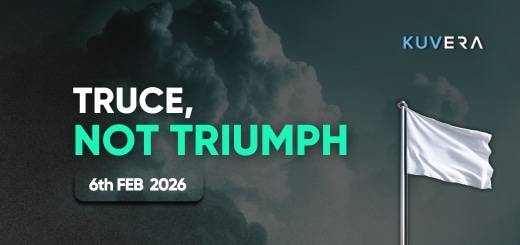In this edition, we talk about the latest scam involving Ketan Parekh that SEBI unearthed this week. We also talk about the MF Lite framework, Adani Group’s plan to exit Adani Wilmar, and what the latest auto sales data shows.
Welcome to Kuvera’s weekly digest on the most critical developments related to business, finance, and the markets.
tl;dr Hear the article in brief instead?

“Every swindle is driven by a desire for easy money; it’s the one thing the swindler and the swindled have in common,” the best-selling American author and professor Mitchell Zuckoff had once remarked.
Every trade is undertaken with only one underlying motive—to make money. But not every trade is a swindle, and not every trader a swindler. This holds equally true for stock markets, which have historically been the easiest avenues to create wealth, quickly and legitimately.
While not every stock market operator is a swindler, not every swindler is Ketan Parekh.
Parekh was previously imprisoned and debarred from the securities market for pulling off the stock market scam of 2000. Now, nearly two-and-a-half decades later, he has again been allegedly involved in a front-running scam.
This week, the Securities and Exchange Board of India (SEBI) issued an interim order, passed against 22 entities, in which it detailed a probe that spanned over 20 locations. The probe led to the impounding of unlawful gains of Rs 65.77 crore.
In its 188-page order, SEBI said that Parekh and Singapore-based trader Rohit Salgaocar devised a scheme to “unjustly enrich” from non-public personal information pertaining to a “Big Client” by orchestrating front-running activities.
The Big Client is a US-based fund house managing $2.5 trillion in assets where Salgaocar had “close connections”, says SEBI. It also says that another conduit, Ashok Kumar Poddar, admitted to being a facilitator in the alleged front-running activities. Poddar, too, had been previously barred from the securities market. SEBI has again barred Parekh, Salgaocar and Poddar from the markets.
So, what exactly was their modus operandi? According to SEBI, traders of the Big Client discussed certain information with Salgaocar prior to executing trades to ensure counter-parties for their trading. Salgaocar shared that information with Parekh to make illegal profits. “When the information reached Parekh, he acted in a systematic manner and trades were executed in different accounts which cumulatively generated unlawful profits,” SEBI said.
What was different about this probe as against previous such investigations? According to SEBI, the new angle was the information flow, how Parekh used his earlier network of Kolkata-based entities for front-running the trades, and how the main players were operating outside the regulatory ambit.
SEBI noted that Salgaocar found counterparties for the fund house’s trades through different market participants including foreign funds, Indian funds, and Parekh. Around 90% of the Big Client’s trades were apparently being fulfilled by Parekh. He passed on this information via WhatsApp chats or phone calls using aliases such as ‘Jack’, ‘Boss’ and ‘Bhai’. His associates would front-run these trades and the spoils were then shared via cash and bank transactions, SEBI noted.
So, what will be the fallout of this case? Will it affect the broader markets? We are not clairvoyants, so we’d rather not comment. But we promise to keep you posted on this one.
Go Passive
Staying with SEBI, the regulator took another step this week as part of efforts to popularize mutual funds. It decided the criteria that passive mutual fund schemes will have to meet to become eligible for its “MF Lite” framework.
SEBI had first proposed the MF Lite framework in July last year. Essentially, the framework is a set of easier rules for passively managed schemes. The aim behind this framework is to lower the compliance burden, encourage competition and make it easier for fund houses to launch less risky schemes.
The regulator approved the rules in September and has now set the eligibility criteria for fund houses to spin off passive schemes. In a circular issued this week, SEBI said that passive funds based on local stock market indices will be eligible for the MF Lite framework if these indices have assets under management (AUM) of at least Rs 5,000 crore. Passive funds based on overseas indices will come under MF Lite in the first phase if those indices have AUM of at least $20 billion.
This framework will cover index funds, exchange-traded funds (ETFs), and fund-of-funds (FoFs). It will also include passive debt schemes based on government treasury bills and state development loans as well as gold and silver ETFs.
So, will the new framework actually attract more fund houses with passively managed schemes? Well, that’s the regulator’s intention. And if it does happen, we will have plenty of more investment options to choose from.
What’s Cooking?
Moving on to the corporate world, the biggest development this week was the Adani Group’s decision to sell its entire stake in Adani Wilmar Ltd, its consumer goods joint venture with Singapore-based Wilmar International.
Adani Group currently owns a 43.94% stake in Adani Wilmar, which sells cooking oil, pulses and wheat flour under the Fortune brand, with Wilmar International holding an equal stake. Adani Wilmar is one of the group’s oldest businesses, having started in 1999. But it listed on stock exchanges only in 2022.
The Gautam Adani-led conglomerate said it will sell a 31% stake to Wilmar and offload the remaining in the open market. Overall, the group’s stake is currently worth about $2 billion.
But why is the Adani Group moving out of Adani Wilmar? Well, the group says it wants to focus on its infrastructure business.
Indeed, an FMCG business doesn’t really align well a group whose portfolio includes India’s largest network of ports and airports as well as power plants, transmission lines, solar energy farms, highway assets, cement factories and a growing real estate business.
The timing of the sale, however, does raise a question mark. This is because it is the first big deal announced by the group since the US Department of Justice indicted Gautam Adani and some other top executives on bribery allegations.
While the Adani Group has previously denied the charges, the indictment has put some pressure on the conglomerate. For instance, French oil major TotalEnergies has paused its investments in the group. For now, however, the group is moving full speed ahead with its expansion plans.
In the Slow Lane
Talking about speed, India’s four biggest automakers reported mixed vehicle sales numbers this week.
Industry leader Maruti Suzuki said its local sales to dealers jumped 24.4% from a year earlier in December to 1,32,523 vehicles. Encouragingly, sales of Maruti’s small cars, which include the Alto, Swift and WagonR models, surged 29% to 62,324 units. For the April-December period, Maruti’s local sales were almost flat.
Hyundai Motor India, which listed on stock exchanges recently, reported a 1.3% drop in local sales in December to 42,208 units. For the entire 2024, Hyundai’s local sales inched up only 0.6% to 6,05,433 units.
Mahindra & Mahindra’s local vehicle sales jumped 18% to 41,424 units, as the maker of Thar, Roxx and XUV700 sport-utility vehicles maintained its momentum. For the April-December period, its sales jumped 21%.
Tata Motors, meanwhile, reported only a 2% rise in domestic passenger vehicle sales to 44,230 units in December.
So, what do the numbers tell us about the state of the auto industry? Well, sales in December jumped, no doubt, but that was mostly because of year-end discounts. For the full calendar year 2024 or for the nine months of the fiscal year 2024-25, sales have been mostly flat. The only exception has been M&M, whose SUVs continue to dominate the roads.
The exception aside, the auto industry came under pressure in 2024 after two years of rapid growth as demand slowed and costs continued to increase. And costs will rise further. Most automakers have already announced plans to increase car prices from this month. But they are also offering some bargains and discounts. So, if you are in the market to buy a new car, shop around and grab the keys soon!
Market Wrap
The pick-up in December vehicle sales pushed auto stocks higher this week. This, in turn, helped benchmark indices to log gains for the second week in a row. Both the BSE Sensex and the NSE Nifty rose almost 1% this week. The small-cap index jumped 1.5% while the midcap index rose 1.7%.
The positive start to 2025 comes after the benchmark indices gained about 8.5% each in 2024, as strong domestic inflows offset foreign fund outflows as well as worries about an economic slowdown and tepid corporate earnings.
The auto index was the biggest sectoral gainer as it advanced about 4%. Royal Enfield bike maker Eicher Motors and Maruti Suzuki climbed nearly 9% each this week. Tata Motors gained more than 5% while Mahindra & Mahindra jumped 4.6% on strong December sales. State-run ONGC also surged about 9%, tracking crude oil prices.
Other Nifty gainers this week included the Bajaj twins—Bajaj Finance and Bajaj Finserv—as well as Adani Enterprises and Shriram Finance. Trent, the top stock of 2024 with 133% gains, advanced further this week.
Tata Motors lost the most among automakers while non-bank lenders Shriram Finance and Bajaj Finserv led the decline in financials. Bharat Electronics, JSW Steel, Grasim, Adani Enterprises, Larsen & Toubro, NTPC and Coal India were among the other major laggards.
Bank stocks were mixed this week, with IndusInd Bank and Kotak Mahindra Bank logging gains but HDFC Bank and ICICI Bank ending in the red. Other stocks that slipped this week included Wipro, Hindalco, TCS, Adani Ports and Dr Reddy’s Labs.
Other Headlines
- Govt’s goods and services tax collections rise 7.3% year-on-year to Rs 1.77 trillion in December
- India’s Manufacturing Purchasing Managers’ Index falls in December to lowest point of 2024 at 56.4
- India’s infrastructure output grows 4.3% year-on-year in November versus 3.7% in October
- India’s fiscal deficit for April-November at 52.5% of full-year target
- SEBI rejects settlement offers by Zee Entertainment, Punit Goenka
- Banks’ loan growth drops to 11.8% in November from 16.5% year ago on tighter lending rules
- Banks’ gross bad loan ratio could rise to 3% by March 2026 from a 12-year low of 2.6% in September 2024: RBI
- Competition Commission of India approves majority stake sale in Prataap Snacks
- National Payments Corporation of India gives Google Pay and PhonePe gives two more years to cut market share
- Contract drugmaker Anthem Biosciences files draft prospectus for Rs 3,395-crore IPO
- Rupee continues to weaken, ends 2024 with a drop for the seventh year in a row
- Singapore’s DBS Bank appoints Rajat Verma as new India CEO
That’s all for this week. Until next week, happy investing!
Interested in how we think about the markets?
Read more: Zen And The Art Of Investing
Watch here: Investing in International Markets
Start investing through a platform that brings goal planning and investing to your fingertips. Visit kuvera.in to discover Direct Plans and Fixed Deposits and start investing today. #MutualFundSahiHai #KuveraSabseSahiHai












